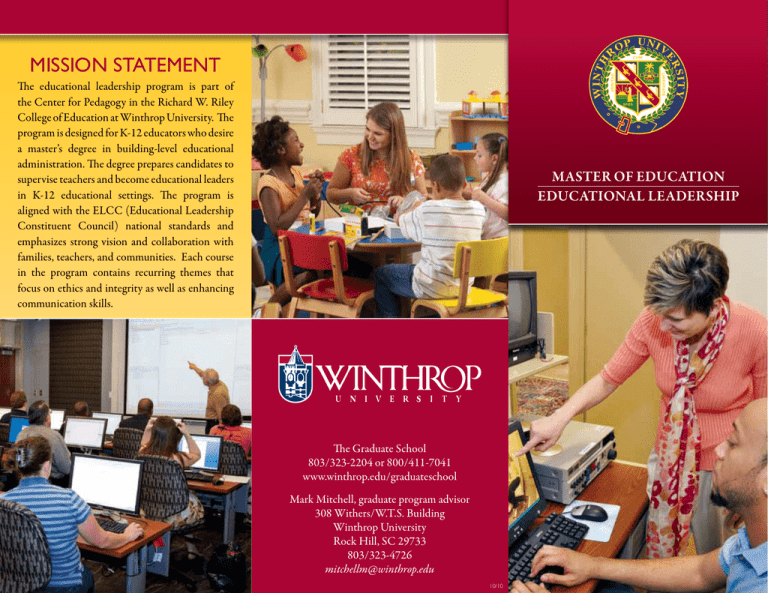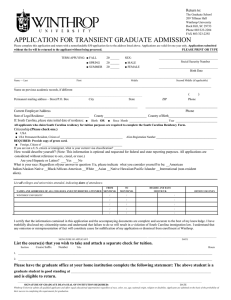Mission stateMent
advertisement

Mission Statement The educational leadership program is part of the Center for Pedagogy in the Richard W. Riley College of Education at Winthrop University. The program is designed for K-12 educators who desire a master’s degree in building-level educational administration. The degree prepares candidates to supervise teachers and become educational leaders in K-12 educational settings. The program is aligned with the ELCC (Educational Leadership Constituent Council) national standards and emphasizes strong vision and collaboration with families, teachers, and communities. Each course in the program contains recurring themes that focus on ethics and integrity as well as enhancing communication skills. Master of Education Educational Leadership The Graduate School 803/323-2204 or 800/411-7041 www.winthrop.edu/graduateschool Mark Mitchell, graduate program advisor 308 Withers/W.T.S. Building Winthrop University Rock Hill, SC 29733 803/323-4726 mitchellm@winthrop.edu 10/10 College of education Emphasis Submit evidence of three years of teaching experience; Faculty The program combines educational theory, policy, and best practice to provide future supervisors with the skills necessary to meet the challenging and changing needs of students and families in schools today. Candidates develop and implement management processes and understand the importance of recognizing, responding and influencing the larger educational contexts. Attention is given to conducting a long-term staff development program, analyzing and developing curriculum, gaining experience observing and evaluating staff members, and analyzing and developing strategies for best practices that promote student learning and school culture. Have an undergraduate grade-point average of 2.75 on a 4.0 scale in the last 60 hours of the graduate candidate’s undergraduate course work; or Mark Mitchell is an assistant professor of educational leadership. Mitchell is a retired superintendent of schools from Missouri where he spent over 20 years as a high school principal and superintendent of schools. Mitchell is a national presenter in the areas of child protection, social justice issues, and school law. While at Winthrop, Mitchell has received two presidential citations and the Richard W. Riley College of Education Award for Collaboration and Service. Graduate study in education leadership leads to a Master of Education (M.Ed.) degree in educational leadership. The M.Ed. program prepares graduate candidates to work as elementary and secondary school principals. Admission Requirements Applicants for admission to the Master of Education program in educational leadership must hold a bachelor’s degree from an accredited college or university and must meet the following requirements to be eligible for consideration: Submit the Application for Graduate Admission including statement of goals; Submit a copy of your current South Carolina Department of Education Class III Professional Certificate or the equivalent from another state; Submit an official score of 900 or above on the General Test of the Graduate Record Examination (verbal and quantitative portions) or an official score of 392 on the Miller Analogies Test (MAT); Present two letters of recommendation to include a recommendation from the applicant’s current principal and district level administrator; and Complete a pre-entrance assessment based on the 7 standards of the National Board for Educational Administration. (Interview, presentation and writing sample). Pre-entrance interviews will be conducted as needed during the fall, spring or summer term. The admissions committee considers all the requirements previously listed when making the admissions decisions. Admission to the educational leadership program is competitive. New admission classes will not exceed 25 candidates. Graduate candidates who are admitted to the program may begin their core classes (EDUC 640 - Educational Research, Design and Analysis, EDUC 670 - Schooling in American Society and EDUC 681 - Advanced Educational Psychology) in the summer. Jennifer Etheridge is a professor of educational leadership. Etheridge served nine years as principal of Kershaw Elementary in Lancaster County School District and two years as assistant principal of Buford Elementary. Her areas of expertise include principal leadership, leadership behavior and emotional intelligence. Mary B. Martin is an assistant professor in the educational leadership program. She has extensive service as a school principal and elementary curriculum director in the Charlotte-Mecklenburg School District. Martin researches dispositions of school administrators and the impact of such dispositions on teacher quality and student achievement.



